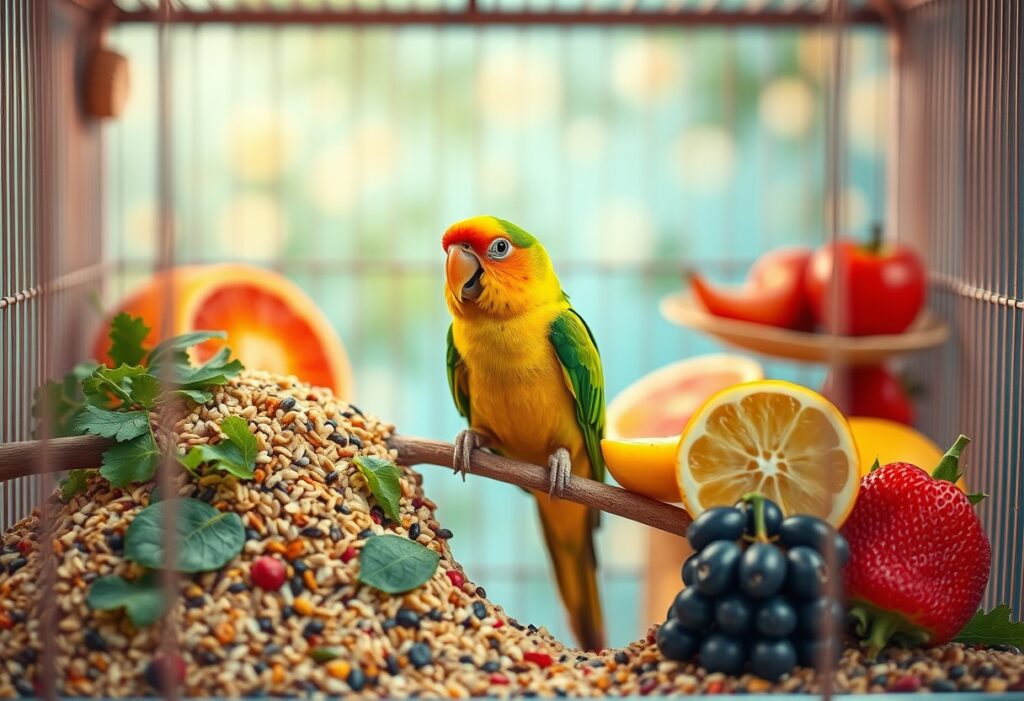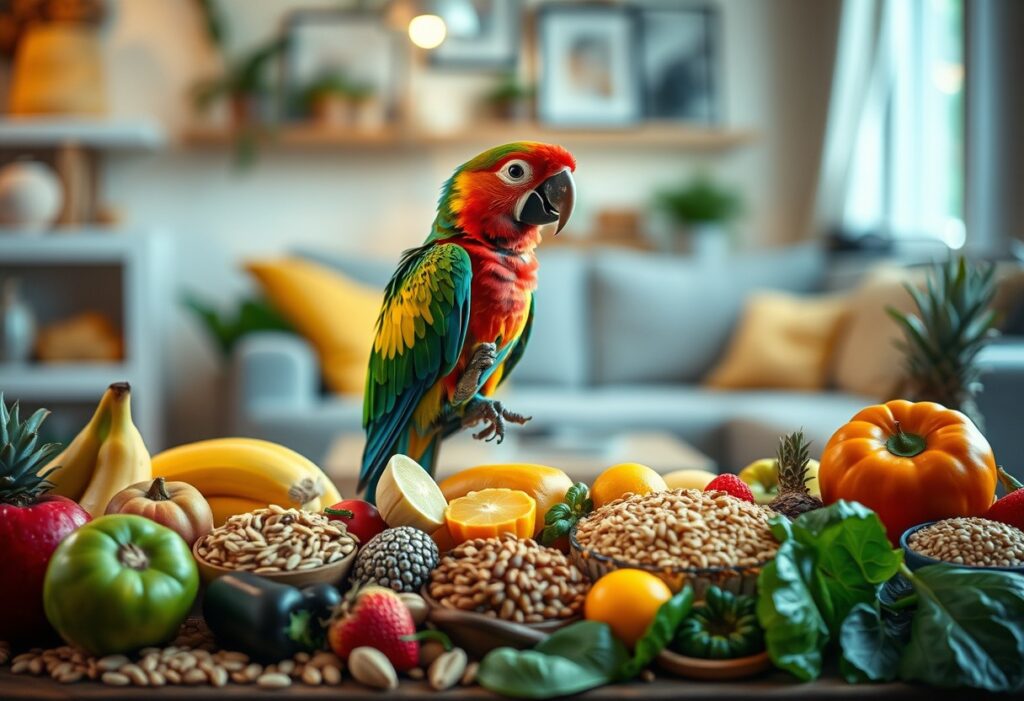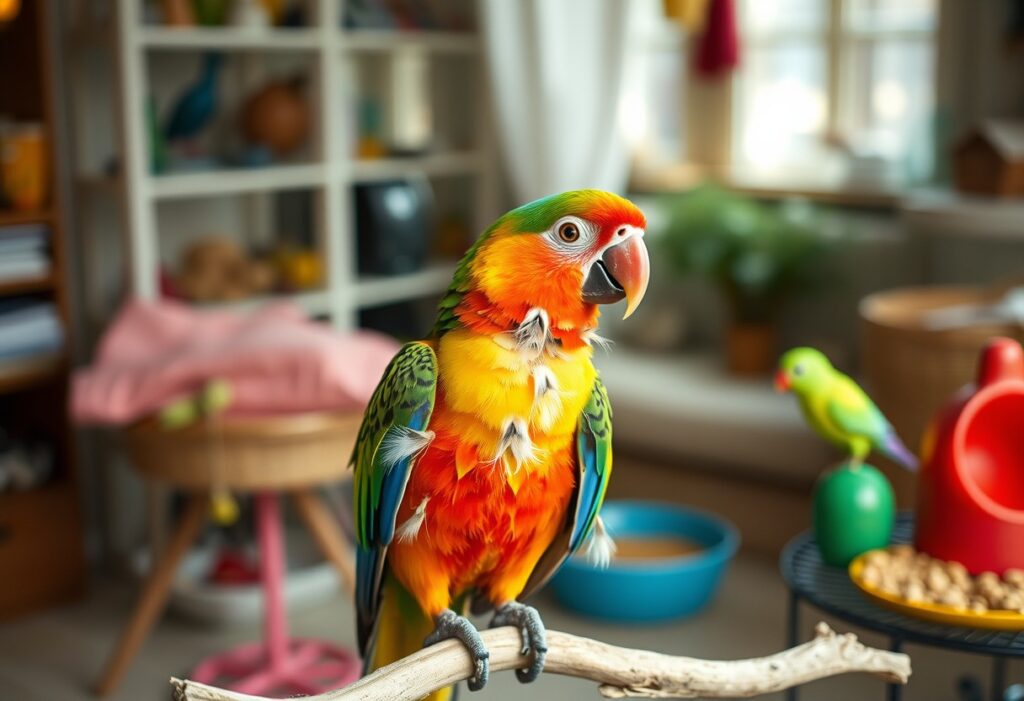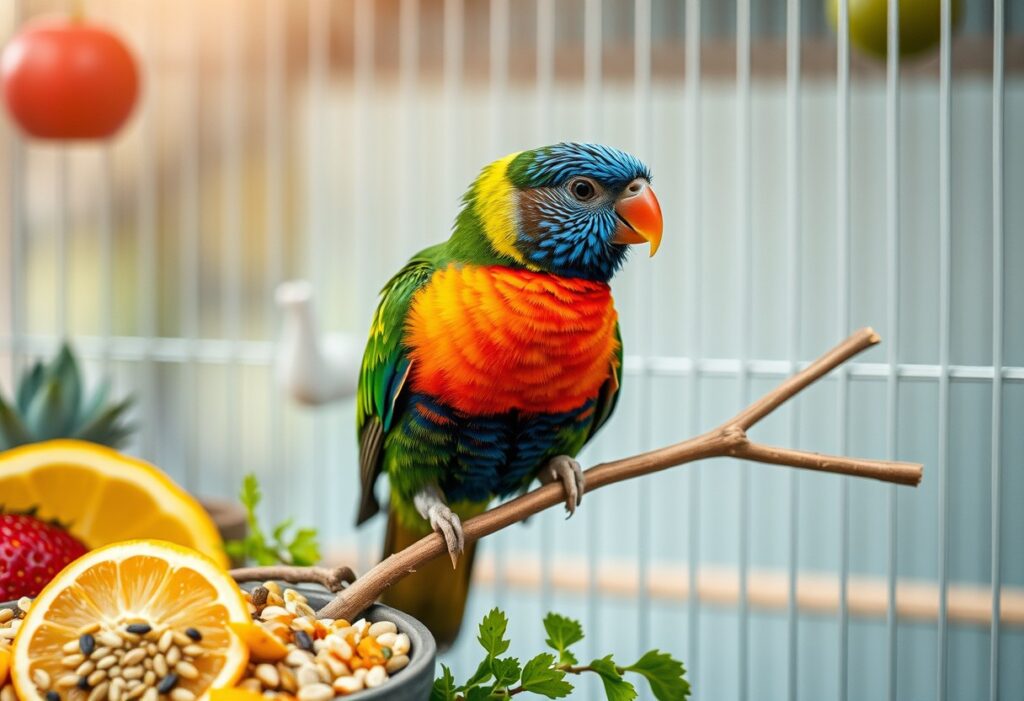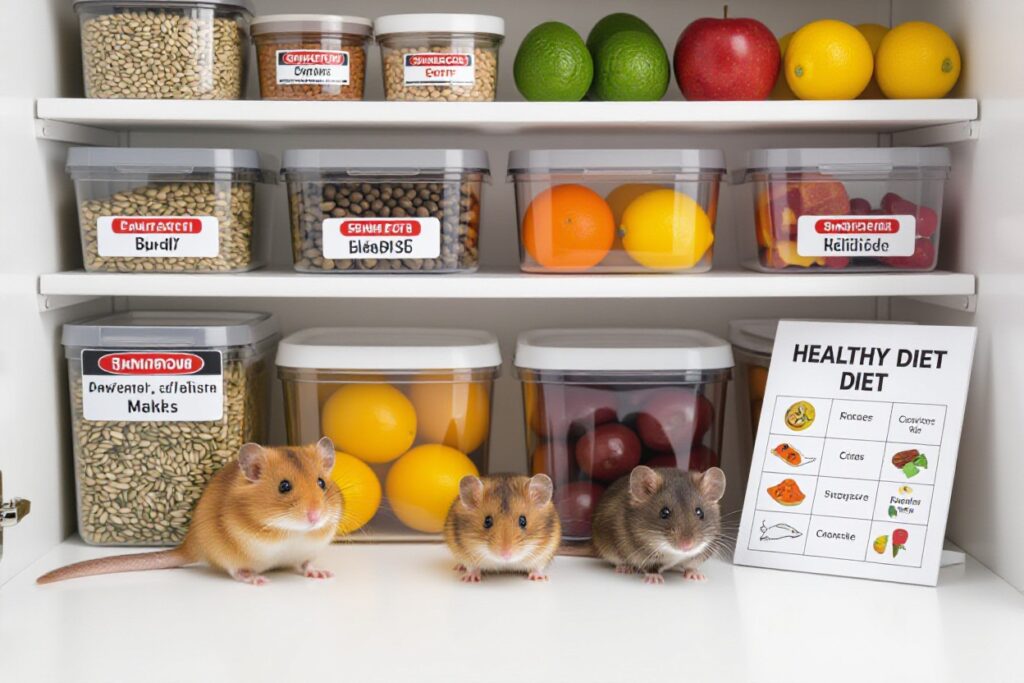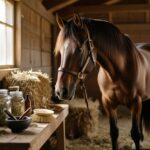Nutrition plays a vital role in maintaining your bird’s health and well-being. By providing a balanced diet that includes the right mix of seeds, fruits, vegetables, and proteins, you ensure that your feathered friend receives the important nutrients it needs to thrive. A poor diet can lead to serious health issues such as obesity, feather plucking, and weakened immune systems. Understanding the significance of a balanced diet will not only enhance your bird’s lifespan but also contribute to its happiness and vitality.
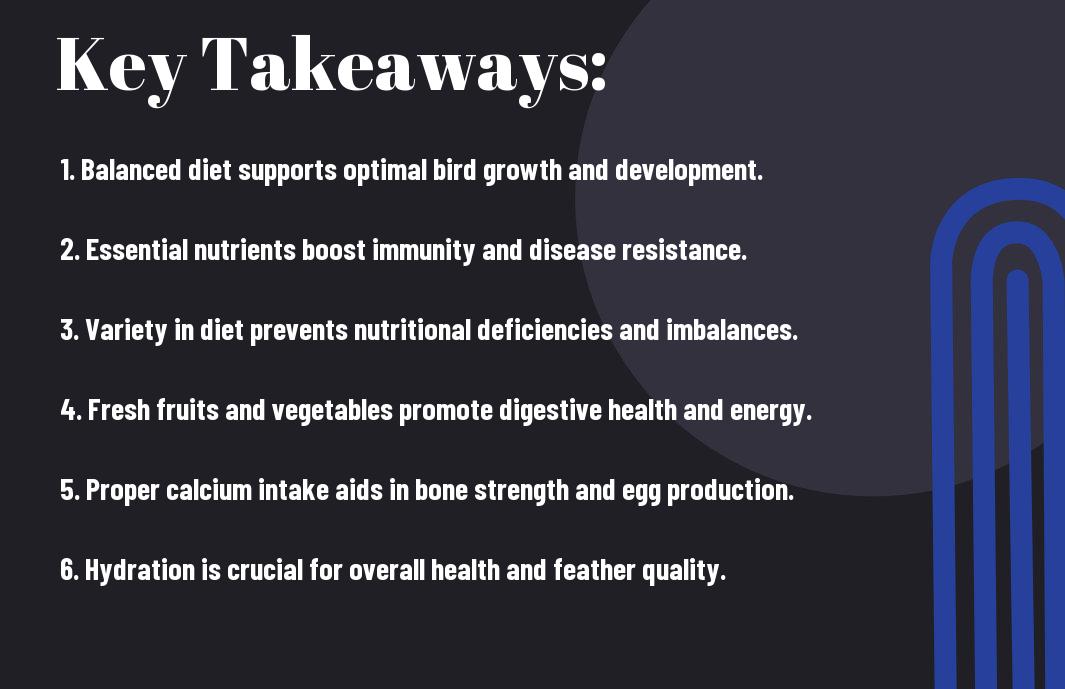
Importance of a Balanced Diet for Birds
Before you initiate on your journey in bird care, it’s crucial to understand the critical role that a balanced diet plays in maintaining your feathered companions’ overall health and well-being. Just as with humans, the nutritional needs of birds vary greatly, and an incorrect dietary approach can lead to numerous health issues. Ensuring that your birds receive the right mix of crucial nutrients is crucial for their growth, reproduction, and longevity.
Nutritional Requirements
To provide optimal health for your birds, you must first grasp their specific nutritional requirements. Birds need a diet consisting of carbohydrates, proteins, fats, vitamins, and minerals to thrive. Each species has different needs; for example, seed-eating birds often require a higher-fat diet, while nectar-eating birds need more sugars and carbohydrates. A well-rounded diet integrates fresh fruits, vegetables, grains, and high-quality pellets, catering to these varying needs.
To ensure that you are meeting your birds’ nutritional needs, it is crucial to pay attention to their natural behaviors and diets in the wild. Wild birds often consume a wide variety of foods, which helps them to get all the necessary nutrients. Mimicking this diversity in your bird’s diet can prevent deficiencies and promote optimal physical condition.
Benefits of a Balanced Diet
To truly appreciate the importance of a balanced diet, you should consider the considerable benefits it provides to your birds. A proper diet not only helps support a strong immune system, but it also enhances energy levels, promotes vibrant plumage, and encourages healthy growth and reproduction. Birds that receive a well-rounded diet tend to exhibit fewer behavioral issues and are less susceptible to diseases.
To understand the broader implications of a balanced diet, recognize that it also fosters emotional well-being and mental stimulation. Birds are intelligent creatures; providing them with various food types can prevent boredom and encourage natural foraging behaviors, enhancing their quality of life. A satisfying diet can contribute to healthier birds, reducing veterinary costs and giving you peace of mind.
Understanding the distinct requirements and benefits of a balanced diet is crucial for your bird’s health. Each bird species has specific nutritional needs, and failing to provide a proper, varied diet can lead to serious health issues such as obesity, feather plucking, and even life-threatening conditions. By prioritizing a balanced diet, you are not only enhancing your bird’s physical vitality but also enriching their overall quality of life.
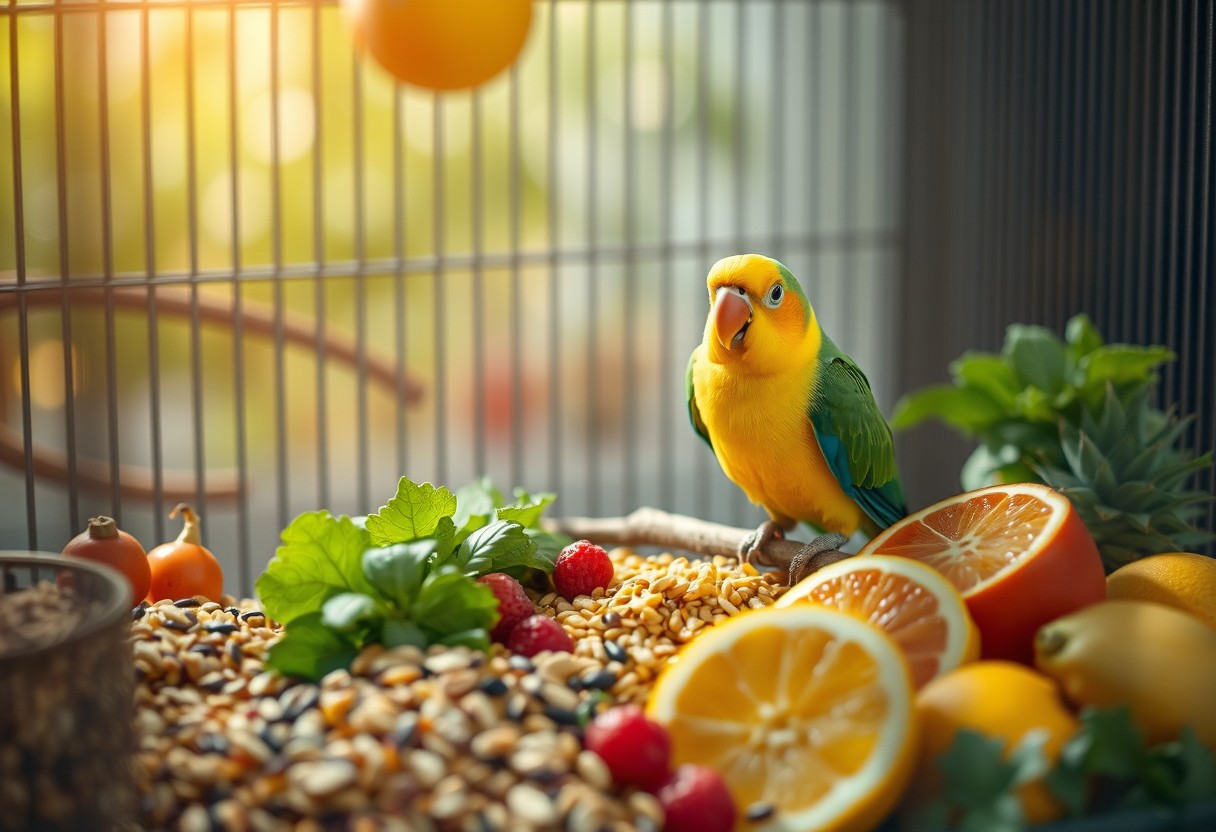
Essential Nutrients for Avian Health
Assuming you want your feathered friends to lead healthy lives, understanding the imperative nutrients their diets must include is vital. Birds require a balanced mix of proteins, carbohydrates, fats, vitamins, and minerals to thrive. Inadequate amounts of these nutrients can result in various health issues, so it is crucial to provide a comprehensive diet tailored to your bird’s specific needs.
Proteins
For your birds, proteins are fundamental building blocks for growth, tissue repair, and the production of feathers. These macromolecules comprise amino acids, which are vital for maintaining strong muscles and organ function. A high-quality source of protein can come from seeds, legumes, and specialized bird pellets, which are formulated to meet their dietary needs.
Moreover, as birds are generally more active, ensuring that they receive adequate protein is imperative for supporting their energy levels. On top of providing strength, proteins also play a role in hormone production and the immune response, meaning insufficient protein intake could negatively affect your bird’s overall health and vitality.
Carbohydrates
To keep your birds energetic and alert, incorporating the right amount of carbohydrates into their diet is equally important. These nutrients serve as the primary source of energy for your avian companions. Fresh fruits, whole grains, and vegetables are excellent carbohydrate sources that also provide additional vitamins and minerals imperative for overall health.
Essentially, carbohydrates not only fuel your birds but also help with their digestive health. A well-rounded diet rich in fiber from fruits and vegetables can aid in regulating their digestive systems, preventing constipation and other gastrointestinal issues.
This balance in carbohydrates is crucial, as over-reliance on low-quality fillers found in some commercial bird foods can lead to obesity and other related health problems. You want to ensure a healthy mix that supports your bird’s natural energy levels without the risk of excess weight gain.
Fats
Any good avian diet should also include healthy fats, which provide imperative fatty acids that are crucial for maintaining cell membranes and promoting healthy plumage. These fats are a concentrated source of energy, which can be particularly important during molting seasons when birds require extra energy for feather renewal.
With the right types of fats—such as those derived from seeds, nuts, and fish oil—you can ensure your birds maintain their vibrant colors and an impressive shine to their feathers. However, moderation is key as too much fat in your bird’s diet can lead to obesity and other health problems, including fatty liver disease.
Vitamins and Minerals
The role of vitamins and minerals in your bird’s diet cannot be understated. These micronutrients are imperative for various bodily functions, including maintaining strong bones, supporting the immune system, and facilitating normal metabolic processes. A balanced avian diet often includes a variety of leafy greens, fruits, and fortified seeds to ensure that your birds receive adequate vitamins and minerals.
This diversity in their food sources plays a crucial role in preventing deficiencies. For instance, calcium is vital for egg-laying birds to maintain healthy shell strength, while Vitamin A is imperative for maintaining good vision and overall health. You must prioritize providing a comprehensive diet that supplies all necessary vitamins and minerals for your bird’s well-being.
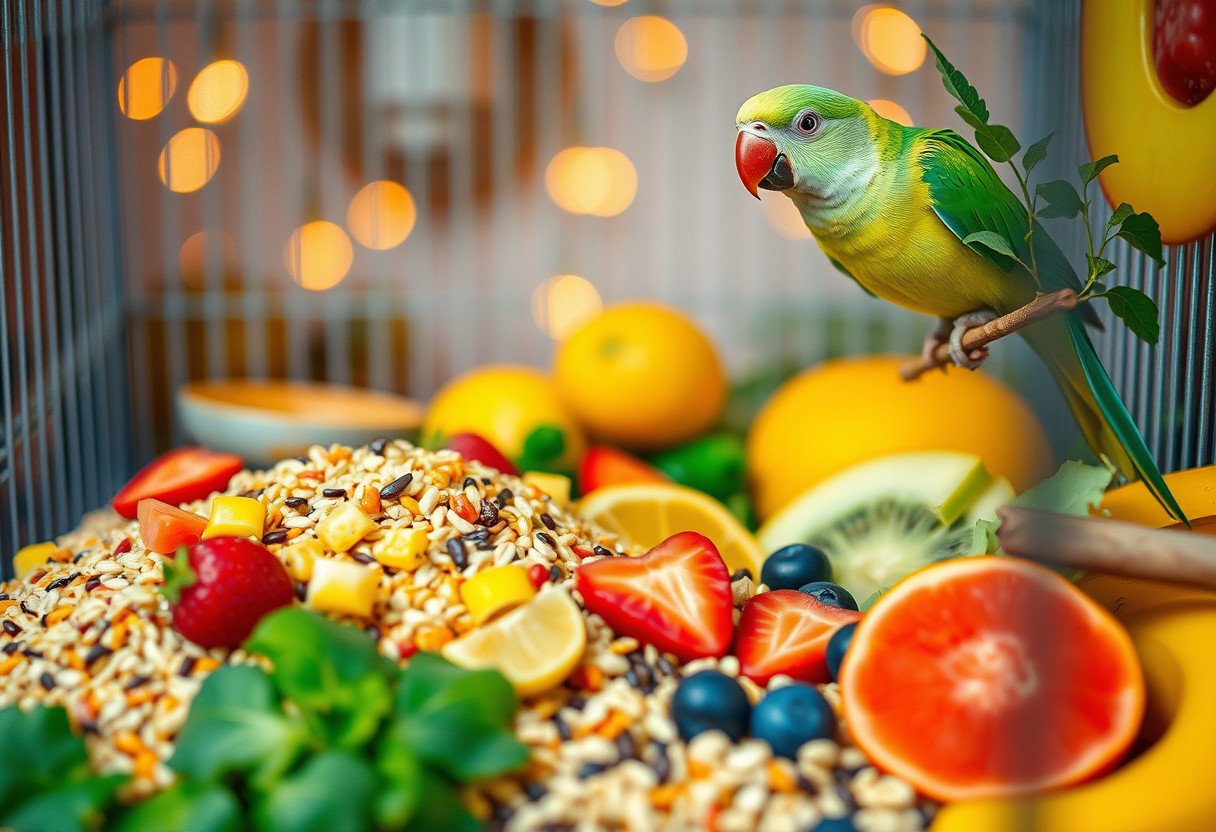
Common Dietary Sources
Keep in mind that providing a varied and balanced diet is crucial for the overall health and wellbeing of your birds. By understanding the specific dietary sources available, you can ensure that your feathered friends receive the necessary nutrients to thrive.
Seeds and Grains
An important component of many birds’ diets includes seeds and grains. These foods provide a variety of important nutrients, including fats and carbohydrates, that are vital for energy. When choosing seeds and grains, opt for a mix that includes sunflower seeds, millet, and oats, as they offer a good balance of fats, proteins, and carbohydrates.
Moreover, it’s important to avoid over-reliance on seeds, as too much fat can lead to obesity and related health issues in your birds. Incorporating a range of seeds with wholesome grains like quinoa or brown rice will promote a well-rounded diet and ensure that your birds remain healthy and active.
Fruits and Vegetables
With a colorful assortment of fruits and vegetables, you can diversify your birds’ diets while providing numerous vitamins and minerals. Birds often enjoy favorites like apples, carrots, and leafy greens. These food options not only add visual appeal but also play a significant role in hydration and digestion.
Understanding the importance of fresh produce in your birds’ diet can lead to enhanced health outcomes. Fruits and vegetables are rich in important vitamins like Vitamin A, which supports eye health, and Vitamin C, which boosts the immune system. Aim for variety, as different fruits and vegetables offer distinct nutritional benefits, contributing to a holistic approach to your birds’ diet.
Protein-Rich Foods
Sources of protein are important for your birds’ growth, tissue repair, and overall health. Foods such as cooked eggs, legumes, and certain insect varieties are excellent protein sources. These foods support strong muscles and provide energy that your birds require for their daily activities.
Common sources of protein, like mealworms and crickets, can be great additions to your bird’s diet. They can be offered live or dried, depending on your bird’s preferences. Highlighting the importance of protein, consider incorporating these foods periodically to ensure that your birds receive enough protein while enjoying a mix of tastes and textures.
Supplements
For optimal health, you might consider incorporating supplements into your birds’ diets. While a balanced diet should meet most of your birds’ nutritional needs, certain vitamins and minerals can be added to prevent deficiencies. Calcium supplements, for instance, are crucial for laying hens to support egg production.
Another point to remember is that over-supplementation can lead to negative health effects, so you should always consult a veterinarian before adding supplements to your birds’ diet. Tailoring supplements to the specific needs of your birds will help maintain their vitality and longevity. By being attentive to their dietary requirements, you are fostering a healthier environment for your feathered companions.
Summing up
From above, it is evident that a balanced diet plays an vital role in maintaining the health and well-being of your birds. By providing a varied diet that includes seeds, fruits, vegetables, and protein sources, you can significantly influence their physical condition, energy levels, and longevity. Each type of bird has specific nutritional requirements, and understanding these needs ensures that you can tailor their diet accordingly, minimizing the risk of diet-related health issues.
Moreover, a well-balanced diet not only supports your birds’ physical health but also promotes strong immune systems and vibrant plumage. By observing your birds and adjusting their diet as necessary, you can ensure that they thrive in your care. Ultimately, investing time and resources into understanding and implementing a balanced diet for your birds will lead to a happy, healthy, and vibrant avian companion, enhancing your experience as a pet owner.
FAQ
Q: Why is a balanced diet crucial for bird health?
A: A balanced diet is important for bird health because it provides the necessary nutrients that support various bodily functions. Birds require a combination of carbohydrates, proteins, fats, vitamins, and minerals to maintain their overall health, support their immune system, promote feather development, and ensure proper organ function. A varied diet helps prevent nutritional deficiencies that can lead to severe health issues, including weakened immune response, poor feather quality, and even metabolic disorders. Providing a balanced diet also supports their energy levels and promotes optimal behavior and activity.
Q: What components should be included in a bird’s balanced diet?
A: A balanced diet for birds typically includes a mix of seeds, fruits, vegetables, and formulated pellets. Seeds provide important fats and proteins, but should not be the sole source of nutrition as they can be high in fat and low in other nutrients. Fresh fruits and vegetables are vital for providing vitamins, minerals, and hydration; leafy greens like kale and dark leafy vegetables are particularly beneficial. Formulated pellets are designed to offer a complete diet, combining various nutrients in the appropriate proportions. It’s important to research specific dietary needs based on the species of the bird, as some may require unique supplements or dietary considerations.
Q: How can I identify if my bird is not getting a balanced diet?
A: Signs that a bird may not be receiving a balanced diet include lethargy, weight loss or gain, dull feathers, changes in droppings, and alterations in behavior, such as increased aggression or anxiety. If a bird is not eating a variety of foods or develops a preference for certain foods over others (like only eating seeds), it may result in nutritional deficiencies. Monitoring their overall health, feather quality, and activity levels can provide clues. Regular veterinary check-ups can help identify any potential dietary issues before they become severe, and an avian veterinarian can provide guidance on creating a balanced diet tailored to your bird’s specific needs.
